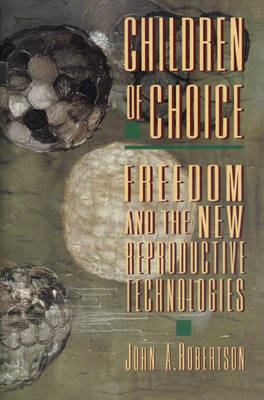
Children of Choice
Freedom and the New Reproductive Technologies
Seiten
1994
Princeton University Press (Verlag)
978-0-691-03353-2 (ISBN)
Princeton University Press (Verlag)
978-0-691-03353-2 (ISBN)
- Titel ist leider vergriffen;
keine Neuauflage - Artikel merken
In this wide-ranging account of the reproductive technologies currently available, the author analyzes the social, ethical and legal controversies surrounding each technique. He then assesses to what extent individuals should be free to pursue the options available.
Cloning, genetic screening, embryo freezing, in vitro fertilization, surrogate motherhood - these are the technologies revolutionizing the reproductive landscape, enabling individuals to conceive or to avoid pregnancy, and to plan the timing of their offspring and even control their characteristics, in ways barely imaginable a generation ago. In this wide-ranging account of the reproductive technologies currently available, the author analyzes the ethical, legal and social controversies that surround each major technology, then determines to what extent individuals should be free to pursue the procedures available and whether government should be authorized to restrict them. Reproductive freedom, Robertson maintains, has traditionally been a right taken for granted. Yet these new technologies, helpful as they may be to many people, carry a price - be it the financial, physical, or emotional strain that in vitro fertilization places on couples or the social danger posed by genetically shaping offspring characteristics. The study examines the broad range of consequences of each reproductive technology and its possible ethical and legal implications.
It establishes guidelines for use by weighing the chance that the technology may enrich and give meaning to an individual's life, against the harm it may cause the larger community.
Cloning, genetic screening, embryo freezing, in vitro fertilization, surrogate motherhood - these are the technologies revolutionizing the reproductive landscape, enabling individuals to conceive or to avoid pregnancy, and to plan the timing of their offspring and even control their characteristics, in ways barely imaginable a generation ago. In this wide-ranging account of the reproductive technologies currently available, the author analyzes the ethical, legal and social controversies that surround each major technology, then determines to what extent individuals should be free to pursue the procedures available and whether government should be authorized to restrict them. Reproductive freedom, Robertson maintains, has traditionally been a right taken for granted. Yet these new technologies, helpful as they may be to many people, carry a price - be it the financial, physical, or emotional strain that in vitro fertilization places on couples or the social danger posed by genetically shaping offspring characteristics. The study examines the broad range of consequences of each reproductive technology and its possible ethical and legal implications.
It establishes guidelines for use by weighing the chance that the technology may enrich and give meaning to an individual's life, against the harm it may cause the larger community.
John A. Robertson is the Thomas Watt Gregory Professor in the School of Law at the University of Texas at Austin, a fellow at the Hastings Center, and a member of the American Fertility Society. He is author of The Rights of the Critically Ill.
| Erscheint lt. Verlag | 5.6.1994 |
|---|---|
| Verlagsort | New Jersey |
| Sprache | englisch |
| Maße | 152 x 229 mm |
| Gewicht | 539 g |
| Themenwelt | Medizin / Pharmazie ► Gesundheitswesen |
| Medizin / Pharmazie ► Medizinische Fachgebiete ► Medizinethik | |
| Studium ► 1. Studienabschnitt (Vorklinik) ► Histologie / Embryologie | |
| Studium ► Querschnittsbereiche ► Geschichte / Ethik der Medizin | |
| ISBN-10 | 0-691-03353-6 / 0691033536 |
| ISBN-13 | 978-0-691-03353-2 / 9780691033532 |
| Zustand | Neuware |
| Haben Sie eine Frage zum Produkt? |
Mehr entdecken
aus dem Bereich
aus dem Bereich
Zytologie, Histologie und mikroskopische Anatomie
Buch | Hardcover (2022)
Urban & Fischer in Elsevier (Verlag)
54,00 €
Gewebelehre, Organlehre
Buch | Spiralbindung (2024)
Urban & Fischer in Elsevier (Verlag)
25,00 €


